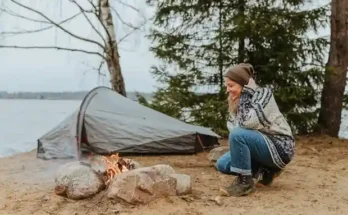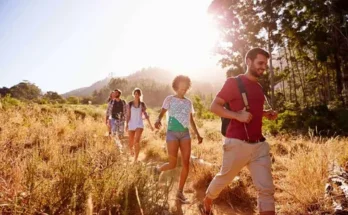Why do the Outdoors Matter?
We live in an era where our days are largely spent under artificial lighting, eyes glued to screens, and feet planted firmly on concrete. Yet, deep within us, there remains a quiet yearning—a primal whisper urging us to step outside, breathe deeply, and reconnect with the earth beneath our feet. This is the call of the outdoors.
The outdoors isn’t just a setting—it’s a state of being. It offers space for discovery, silence for reflection, and movement for healing. Whether it’s a morning walk in a nearby park or a week-long trek through wild landscapes, the natural world holds the power to transform how we live and feel. According to Wikipedia’s page on the benefits of nature, even a few minutes outside can have measurable positive effects on our mental and physical health.
Nature and the Mind:
Something remarkable happens when we venture into open spaces. The noise of daily life begins to fade, replaced by birdsong, rustling leaves, and our own steady breath. Science is finally catching up to what many have known intuitively: being outdoors is good for the soul.
- Reducing Stress and Anxiety
Numerous studies have shown that time spent in nature lowers cortisol levels, the hormone responsible for stress. A simple 20-minute walk in a green space can calm the nervous system, reduce anxiety, and improve mood. Forest bathing—a Japanese practice called “shinrin-yoku”—has become globally recognized for its therapeutic effects on mental health.
When we’re outside, we’re not multitasking or scrolling. We’re simply present. The world slows down, and with it, so do we.
- Enhancing Creativity and Focus
Nature not only soothes but stimulates. Time outdoors has been shown to boost creativity, especially after prolonged exposure to natural settings. Think of it as a mental reset button. Artists, writers, and thinkers have long found inspiration under open skies and within forest trails. Communities like Reddit’s Outdoor Adventures forum are filled with stories of how spending time outside has helped people find clarity, motivation, and new ideas.
Even short breaks outside during the workday can improve concentration, problem-solving, and energy levels. The mind, it seems, thinks more clearly when it’s breathing fresh air.
The Physical Benefits of Outdoor Living:
Beyond the mental lift, outdoor activities are a boon to the body. Unlike indoor gym routines, nature-based movement engages muscles differently, challenges coordination, and connects us with terrain that constantly shifts and surprises.
- Natural Movement and Fitness
Hiking, climbing, kayaking, cycling—these are not just hobbies but full-body workouts. The uneven surfaces of trails activate stabilizing muscles, rivers test our balance and strength, and hills build endurance. Unlike treadmills, the outdoors doesn’t repeat itself. Every bend and slope requires attention and effort.
What makes outdoor fitness truly unique is its effortless engagement. You’re not counting reps; you’re chasing views, crossing streams, and covering miles. Exercise becomes an adventure, not an obligation.
- Improved Immune Function
Sunlight, fresh air, and exposure to natural microbes can help boost immune health. Vitamin D, which our skin naturally produces from sunlight, plays a crucial role in regulating immune response. Meanwhile, breathing in phytoncides—organic compounds released by trees—has been shown to increase white blood cell activity.
The result is a body that’s not just stronger, but more resilient.
Outdoor Experiences that Change You:
Nature doesn’t just entertain us; it shapes us. It challenges our comfort zones, teaches humility, and reveals our inner strength. Many people find that some of their most defining moments happen not in boardrooms or bedrooms, but on mountaintops, in deserts, or under a canopy of stars.
- Solitude in the Wilderness
There’s a unique power in being alone outdoors. Not loneliness—but solitude. It gives space to think, to process, to just be. Without the constant ping of notifications, the mind finds clarity. Without mirrors or makeup, we start to see ourselves as we are.
Backpacking through quiet trails, solo camping, or simply sitting by a river alone allows deep introspection. In those quiet spaces, many people report feeling more connected—not just to nature, but to themselves.
- Connection Through Shared Adventures
While solo time in nature is powerful, the outdoors also has a magical way of deepening human connection. Shared struggles—like getting lost, making camp, or pushing through difficult terrain—build bonds quickly.
A weekend camping trip can connect people in ways a dozen dinners never could. There’s vulnerability in the wilderness, and in that openness, true relationships thrive—whether among friends, partners, or families.
The Digital Detox You Didn’t Know You Needed:
Let’s face it: we are more connected than ever—and more distracted, too. Our attention spans are shrinking, our sleep cycles disrupted, and our joy dimmed by constant comparison. Stepping outdoors offers a digital detox that doesn’t require an app or subscription.
- Reclaiming Presence
Without Wi-Fi signals, we begin to notice the simple, beautiful things again: the curve of a tree branch, the rhythm of our own breathing, the way shadows stretch in late afternoon light. The outdoors teaches mindfulness without ever using the word.
It reminds us that presence is not something to chase—it’s something we return to.
- Realigning Priorities
Time outside also shifts our internal compass. Problems that once seemed overwhelming often shrink in the face of vast landscapes. That stressful email, that frustrating meeting—suddenly, they don’t feel so big anymore. Nature provides a wider lens through which to view life.
Making the Outdoors Part of Your Life:
You don’t have to be a mountaineer or wilderness guide to enjoy the benefits of outdoor living. It starts with small, intentional steps. Choose to walk instead of drive. Eat your lunch on a park bench instead of your desk. Wake up early to catch the sunrise from your balcony.
- Building Rituals in Nature
Try making the outdoors part of your daily or weekly rhythm. A Sunday hike. A morning meditation under a tree. Stargazing once a month. When nature becomes a ritual, not a rare retreat, it begins to nourish us more deeply and consistently.
It’s not about conquering nature—it’s about belonging to it again.
The Outdoors Is Not a Luxury:
In today’s world, nature can sometimes feel like a luxury—reserved for weekend getaways or curated social media shots. But it isn’t. The outdoors is not a place we visit; it’s where we come from. It’s not something separate from us; it is us.
Our bodies are wired for sunshine, for wind in our hair, for dirt under our fingernails. The more we separate from the outdoors, the more disconnected we become—from our health, our community, and ourselves.
Conclusion:
No matter where you live—city, suburb, or countryside—the outdoors is never far. A park, a trail, a river, even a patch of sky from your window—nature is always offering a way back. And every time we step outside, we’re stepping toward something ancient, essential, and deeply healing.
So take that step. The wild is waiting—not just to be explored, but to remind you of who you truly are.




